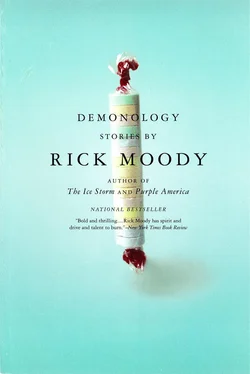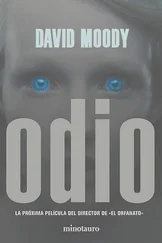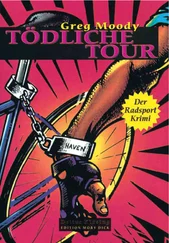Is the celluloid of Los Angeles — in editing-room strips, unassembled by freelancers — influenced by the lives of this city? Or are the lives of Los Angeles influenced by this high-profile movie business? Or is the relationship between the two fluid, circular, and continuous, and therefore not to be separated into two discrete quantities — Los Angeles and the movie business? Who has time for questions? Lily is late. If Thea wants to have juice for godsakes, she’s not so late that she can’t stop for juice, since she has borrowed her friend Ellen’s Mercedes — her own is in the shop. Thea can have juice even though Evan is after school being I.Q.-tested and she’s supposed to pick him up and then she’s supposed to pitch a woman at the Fox lot and the script needs another writer, another in a series of writers, some entire sewing circle of writers. Here’s how the back end works, according to the letter of agreement that came from the lawyer this morning —2½% net, which is frankly embarrassing, her lawyer told her, and the term of license is all wrong, way too short, the term is ridiculous even if it is a small movie, the story of a strong, sympathetic woman from the South and her conflicts with the political and social institutions of small-town America in the early decades of this century — just right for a self-starting independent director who’s not bound by the constraints of the studios. Lily’s not sure if she’s attracted to the script because she herself is a strong, sympathetic woman from the South (relocated to the Brentwood area) or rather if the action of pitching the script reconfigures her in a way, so that suddenly she feels stronger and more powerful. She’s not exactly sure if all this legal language is really coherent, the language at the center of the deal (as her lawyer describes it), or whether language itself clutters up what otherwise might be simple. Language hangs in potential, as with preedited strips of footage at the editing facilities, like confetti or Christmas tinsel or strips of fly paper in dingy coffee shops of the unvisited downtown section of Los Angeles. The language of her town, the cinematic lexicon, is seductive and dangerous, but it enables her, when transmuted into her occasionally generous paychecks, to afford better than the McDonalds on Pico. So why are they here? According to what rationale? Do they even have juice at McDonald’s? she asks Thea in the rear-view. Honey, do you want to stop here at McDonald’s? And what’s Thea doing in the backseat, anyhow? Don’t you want to come sit up here with me? I hate that feeling that I’m just driving you around and that’s all I’m good for, but Thea says she likes it in back, and she’s playing with a doll that looks exactly like, or not exactly like but extremely close to the woman who was in the luggage commercial with Lily four years ago, when she was sitting in the baggage claim area at DFW — they had rented it overnight for an astronomical sum — and she was dressed in a conservative, pinstripe suit with a hemline about so, sitting with one of those fancy new rolling suitcases, a suitcase with rolling and pivoting mechanisms (the corporate people told her), and as the cameras turned she pulled this sleek gray suitcase from the baggage carousel, and, according to instructions from her Austrian director, said, as though a future of unlimited possibility were hers, It makes every other piece of luggage obsolet. Meanwhile, as she was getting comfortable between takes, there was this blonde, this beautiful, radiant but finally vacuous blonde sitting on the edge of the carousel beside her and this blonde made Lily uncomfortable, as though she were creeping toward Lily, riding around and around on the carousel driven centrifugally toward Lily to pounce on her like a succubus or a particularly rapacious condor, embodying a message of obsolescence, the inevitable obsolescence of older women actors (thirty-four years old), this blonde actually trying to render her obsolete, a young waitress from some Rodeo Drive luncheonette getting the big break, while Lily was coming to the end of her streak of well-paying but shallow roles in commercials. Once you have met this particular blonde you don’t forget her. Lily wonders if she became a producer because of her work in commercials —because commercials taught her how to exaggerate wildly with the appearance of total conviction. The point being that Thea’s doll looks like the blonde who had climbed from the baggage carousel to steal Lily’s career, whom Lily never really saw except in the undertow of some sleep-deprived vision in DFW, likewise she can’t really be sure that the doll looks exactly like the blonde anyhow, since she’s trying to drive and keep an eye on the clock and she’s also dangerously interested in a copy of a magazine on the passenger seat which is open to an article about a big new production of some musical by Rogers and Hammerstein — with rich Technicolor photos — and she should be back at school to pick up Evan, who’s being I.Q.-tested because they suspect there’s something wrong with him, because, in fact, Evan is preoccupied with musicals to the exclusion of all other cultural productions and that’s how the magazine came to be in the front seat in the first place, because Evan was looking at it. There’s a circular aspect to this, to the way she grew up with a brother with a certain neurological difficulty and now has a son who might well have a similar neurological difficulty, among his eccentricities refusing eye contact, refusing to be touched, excessive interest in musical comedy. Is she able to care for Evan because of her brother, or will Evan in turn make some lasting contribution to her relationship with her brother (who continues to live robustly and to make primitivist paintings)? She would assuredly weep about all this, curse God or the heavenly planning commissions responsible for such things, had she more time. Traffic is heavy and that’s the one good reason to stop at the McDonald’s on Pico, which is a drive-thru, that oasis outside of the traffic, into which you go inching forward and then around and out. She’s reminded temporarily of her husband. He’s a really, really great guy, puts up with her twists and turns, and he’s terrific looking, with a lot of forehead, and a thatch of hair upon his chest and he’s hardworking, and there are really no problems at all, really, you know how these things are, but they are taking the hard right at the drive-thru entrance to the McDonalds on Pico, and there’s a car in front of her, completing its fast-food order, which seems to be, when handed through the window, something for a child, because there is the bright packaging that comes with the Happy Meal, which also contains, undoubtedly, its fully poseable action figure. Collectors go mad for this stuff. She imagines that the action figure is the blonde on the baggage carousel turning endlessly, stuck in some nexus of recurrences. Then the Saturn (before her) pulls up six feet and stops suddenly, and the car behind her (in the rearview), a banged-up Dodge Omni, stops suddenly, and she looks at the man in the tinted drive-thru window of McDonalds, at his amiable, open features. He’s laughing. However, his expression scrambles as she gazes upon it, disappears in the window, such that the tinted window has suddenly an uncanny fullness, and then she looks at Thea, who is in the backseat, muttering directorial instructions to her blond doll. On the menu wall next to her, next to Lily and Thea, a voice rumbles from a two-inch woofer, Order, please? And Lily thinks, yes, order, please, but says instead, Happy Meal and a large orange juice, uncertain if orange juice is really possible here in this zone of fast-food particulars. She glances out the passenger window, and it will be the casualness of this glance that will frighten her later on. What if she had not looked? What if she had not, as if in reverie, found, before her, the origin of all disorder — like a villain of westerns upon his dark steed — in baggy jeans and mesh T-shirt and backwards baseball cap, removing his weapon from the cinched waist of baggy jeans. His underwear is definitely Calvin Klein, she notices. And it’s an automatic weapon, though she knows nothing of these, of revolvers or semi-automatic or automatic weapons, except what the films of her city have shown her. Has each scriptwriter in the metropolis thus been witness to such an incident? Or is it only Lily who wants only to make films about powerful women opposing rigid, small-town social institutions, who is now, unfortunately, going to experience weaponry firsthand? Have all the kids who discharge these firearms been to see the movies in which weapons technologies so often appear? Do the films generate the weapons or vice versa, or are the guns somehow spontaneously generated? The kid with the weapon has no idea that she’s in a rush to go see the I.Q.-testers about Evans disability and therefore to discuss Evan’s tendency to sing entire musicals from memory — South Pacific and Oklahoma! — and this boy obviously doesn’t know that Thea just wants juice or that Lily is still living off the paycheck from a commercial in which she pronounced the words, It makes every piece of luggage obsolete, and if this boy did know these things, he might shoot her anyway. This is not the best block, but it is not the worst block either, and the argument that she just shouldn’t have driven here will not be adequate, but there is no time for the argument, in any case, because now the boy starts shooting. He’s a teenager, and the gun is turned, thank God, away from Lily, and this boy’s ass, amid a billowing of shorts over the margin of baggy trousers, is pressed against the passenger window of Ellen’s Mercedes. He appears to be firing into a crowd, into the parking lot adjacent to the drive-thru slip, into a crowd of other teenagers, teenagers schooled in secret handshakes and semaphoric gesticulations and certain uniforms, teenagers now scattering, and Lily reaches back and grabs Thea by the hair and says, Youare going to have to unbuckle yourself and get yourself down, and Thea says, But I don’t want to, and she says, Idon’t care what you want, just get down, and she has to be a little rough with her daughter, as soon as Thea has sprung the belt, shoving the girls strawberry blond head down after the rest of her down into the footwell between backseat and front, after which she launches herself between the seats, over an armrest, to cover her giggling daughter with her arms, Will one body stop a hailstorm of bullets from entering a second body? Will this water and blood and bile stop a bullet or is that just the stuff of movies? She imagines that she should be composing desperate pleas, Ilove my daughter and I love my son even though he has certain difficulties and I love my husband and I only stopped here for juice, though I am not sure that McDonald’s even serves juice, and I think you should just let me drive on out of here and we can forget about the history of trouble between our two peoples, but she doesn’t think any of these things, really, and Thea says, Mom, you’re squishing me, but the truth is that Lily is actually, at this moment, thinking about luggage. Rolling suitcases are really an improvement, if you should find that you are going in and out of a number of airports in a short period of time — on a promotional junket, for example. She happened to notice in DFW, where they filmed the luggage commercial, that the airport was so enormous that you had to take a train to get from one end to the other. DFW was as big as Manhattan someone told her. Or maybe that was Denver. In airports this enormous, the rolling and pivoting mechanisms of contemporary luggage design will certainly be an improvement over portage-style suitcases. Lily’s conviction is that the rolling design is so profound that it will cause further alteration in the way Americans travel. They will change planes more often. They will go to more motels. She releases Thea for a moment, to peek over the margin of the rear window, in a reloading silence, just before the kids from across the parking lot begin to fire back —directly at Ellen’s Mercedes — and the sound of these bullets is like the kernels of Cineplex Odeon or Sony Theatres popcorn inflating in a patented steam-popping apparatus, or it is like a rambunctious Independence Day celebration; her similes are optimistically nonlethal, though the bullets nonetheless perforate the side of Ellen’s Mercedes. Lily hopes there is no actual tendency for gas tanks to explode under these circumstances, that the bluster of cinema is responsible for this cliche. Mom, what’s happening? Thea asks, and Lily says, Please, keep your head down, okay? And the kid, the boy, reclining against the side of the Mercedes begins to lope off toward the rear of her car, but before he does so he stops and looks into the backseat, through the lightly tinted glass, he eclipses all the light in the car, filling the window with the butt of the gun and his face and his mesh t-shirt, and his hairless chest underneath, and he looks in at Lily, and their eyes meet, and then bullets rain down again from across the parking lot. The sewing circle of writers will come back to this again and again trying to understand how we could live so close to this boy and never understand the meaning of his smile, how he smiles nervously and hopelessly and menacingly, all these meanings in one smile — he’s just a kid, not old enough to vote, not old enough to avoid voting — and then another car screeches to a halt beside the Mercedes, a black Jeep, late model, yes, Lily is sitting up, though this is the wrong posture to take, and the Jeep draws the fire, though so far not a single arterial fountaining has she seen, and there are likewise no cries of pain, no spontaneous oaths of revenge. Everyone is concentrating. Would she know if she were hit? The boy leaps into the backseat of the Jeep, and the back door flaps, unclosed, as the Jeep goes over an edge of curb and sidewalk and out onto Pico, completing its drive-thru circuit, and then a car from the parking lot, with boys and girls cursing, loads up at once and gives chase, and then all is silent.
Читать дальше












